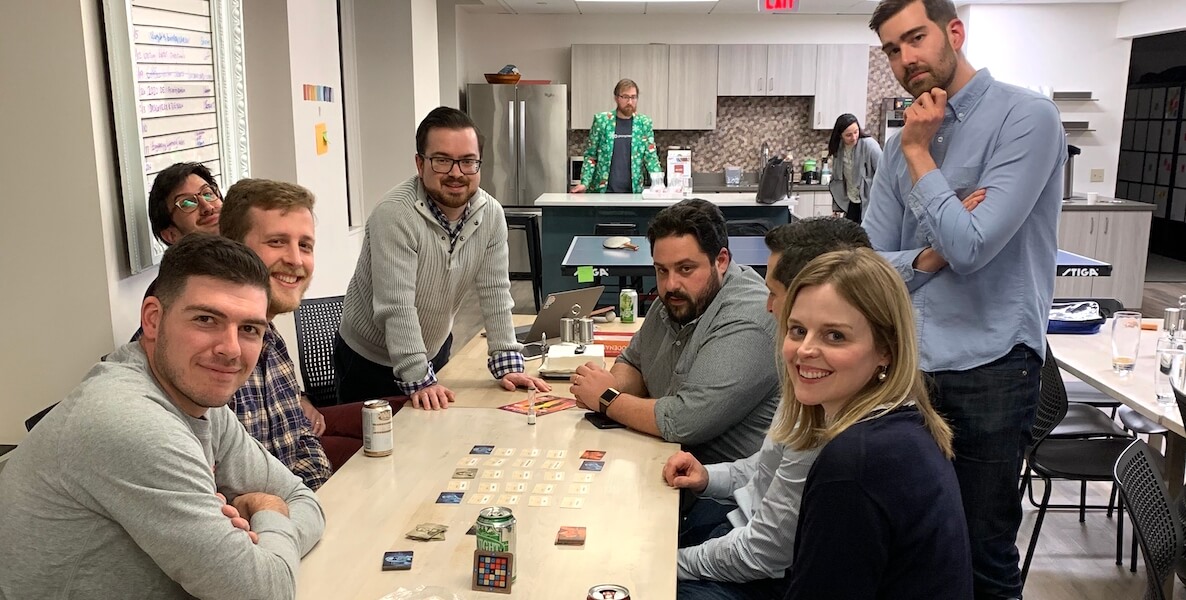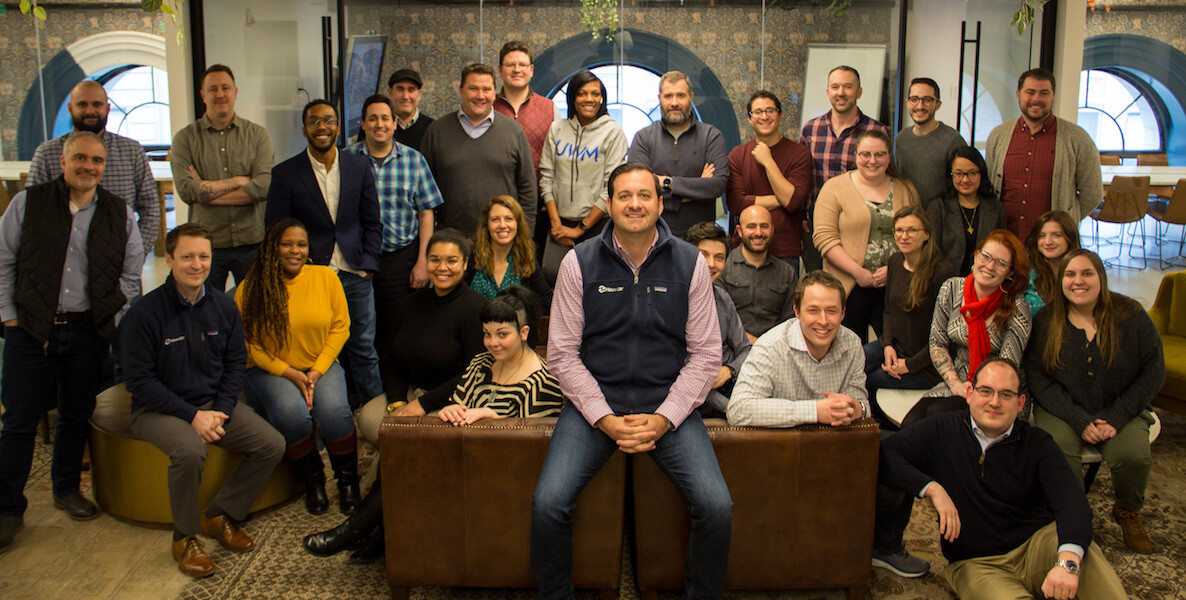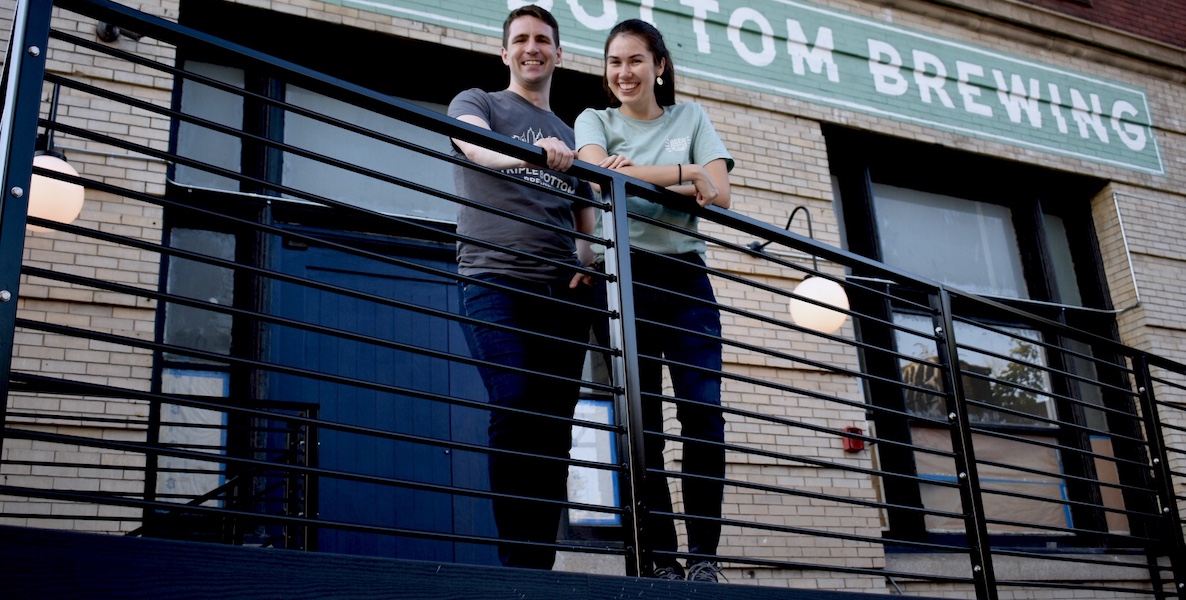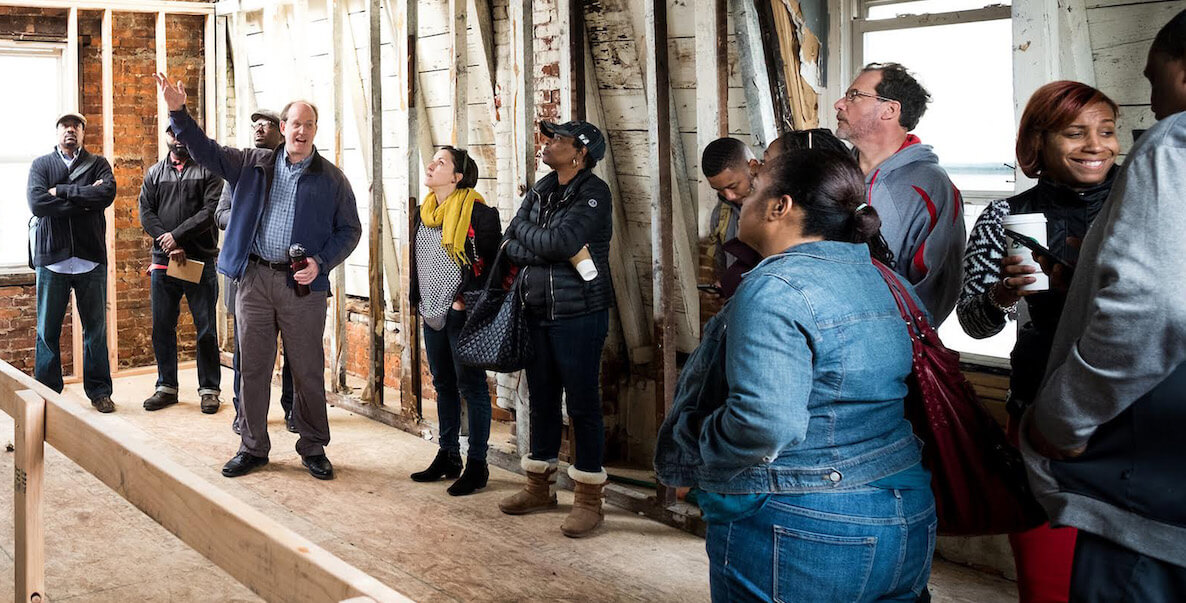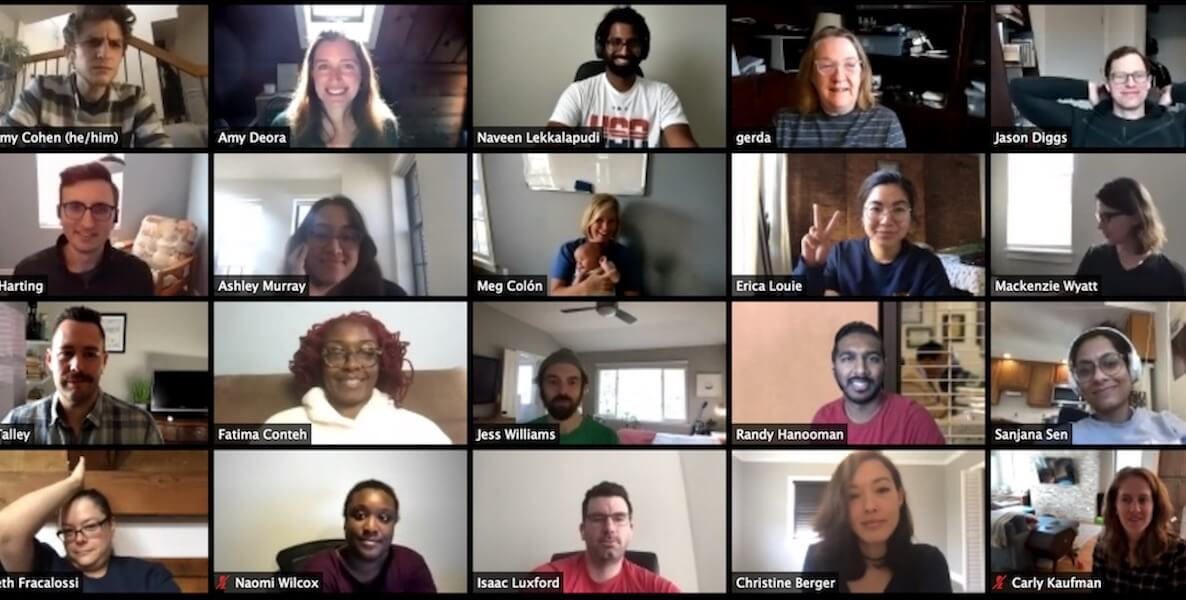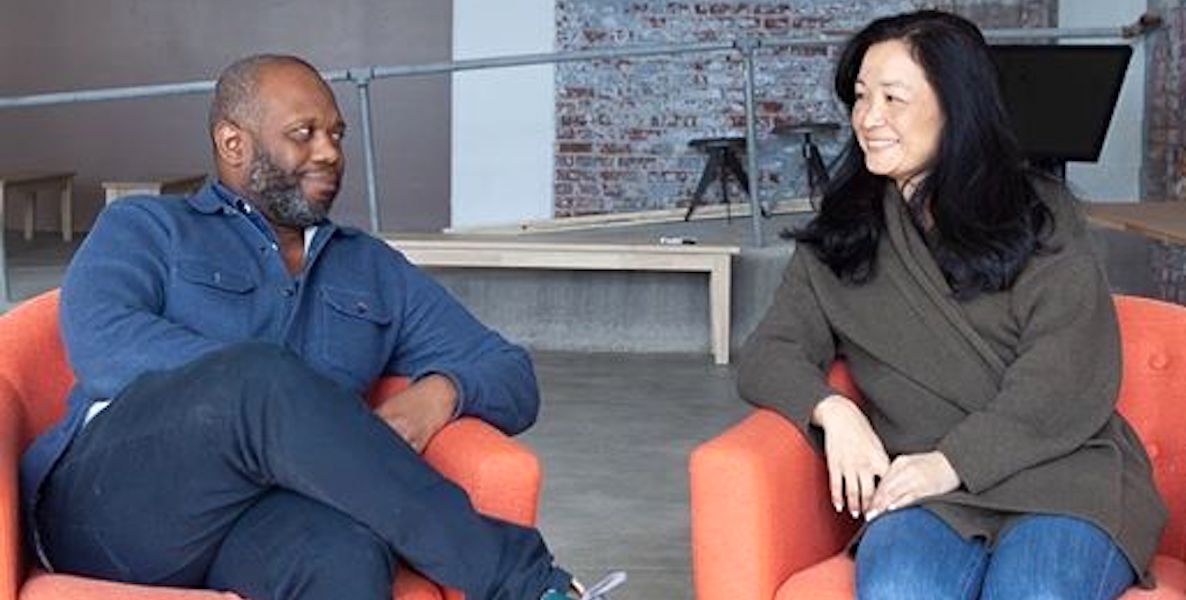On a typical day, the open floor plan in the Center City office of Guru Technologies looks a little more music hall than tech startup: The walls are bedecked with posters of concert venues designed by Guru employees and local Philly artists.
The conference rooms are named after local music venues and the office even sports its own stage. It’s only the thrum of developers and software engineers clicking away at their computers—rather than strumming guitars—that lets on that this is the headquarters of one of Philly’s fastest-growing tech startups.
But on the afternoon of September 27, 2019, the office did in fact become a full-on concert hall. Local artists like Marielle Kraft, Andrew Lipke and The InGlorious took the stage, playing everything from indie-pop to soul music, while several dozen people milled about, snapped photos and chatted over food and drinks.
Explore Guru & Fishtown AnalyticsDo Something
“It was an awesome fusion of music, tech, and innovation, and several local organizations jumped at the chance to open their offices to the event,” says Guru co-founder and CEO Rick Nucci. Guru is a software service firm that offers a way for companies to create an internal company “knowledge database,” that can be integrated with common tools like Google Chrome, Slack and Zoom.
The company was born out of Nucci’s and his co-founder Mitch Stewart’s experience building their previous company, Boomi, which was acquired by Dell in 2010.
“Welcoming attendees interested in learning more about tech into our offices benefits the whole community and creates opportunities for all of us to learn and connect with one another,” Nucci says.
Of course, turning an office space into a live music venue is exactly the kind of flashy employee perk people have come to expect from tech companies. Giants like Google and Twitter boast a wide range of oddball employee perks—onsite acupuncture, nap pods, private concerts.
But REC Philly’s Tech Tour wasn’t just about pampering employees; it was about providing educational opportunities for people in Philly who are interested in tech, and bridging two communities, tech and music, that might not otherwise interact. After the event, about 40 Guru employees went to Philly Music Fest at World Café Live to continue supporting the city’s music scene.
That spirit of education, camaraderie, and community is increasingly—and refreshingly—at the forefront of many local tech companies; think Houwzer, or Promptworks. And two new standouts are following suit: Guru, and Fishtown Analytics, which is an open-source software engineering firm.
In addition to a wide range of employee benefits, Guru has made volunteering one of the centerpieces of its company culture; and Fishtown Analytics has cultivated an office culture where diversity, equity and inclusion are embedded at every level of the business.
The firms, which both raised millions in venture capital funding last year, are part of a broader movement where companies prioritize doing good alongside generating profits. Founders of both firms say their civic-minded approach has helped their companies grow.
Clear-cut values
For both Guru and Fishtown Analytics, explicitly defining their company values and determining how to act on those values occurred early in the founding process.
Nucci and Stewart, both startup veterans, decided to write down their values once the company had around 20 employees. “If values are not defined, then they’ll define themselves,” Nucci says. Those values, which are now publicly displayed on the company’s website, include tenets like “seek and share knowledge” and “learn and grow.”
These values can be seen both in how the company treats their employees—Guru offers paid parental leave, a flexible paid time-off policy and the ability to bring dogs to work— and in the actions of individual workers. When a new employee is hired, they have a one-on-one meeting with Nucci to go over the company’s values and how they can act on them.
“We believe that success at Guru is not ‘growth at all costs,’” Nucci says. “We must recognize the communities around us where Guru exists, and help and support those communities as we are growing. Give first, not back.”
The company also has a Slack channel where employees highlight work that their co-workers are doing that embodies a particular value, and the team showcases some of these “case studies” in monthly employee meetings. These actions may seem small, but Nucci says that they go a long way in ensuring that company values and culture aren’t just buzzwords.
“We built these values to be actionable, not just a list of words that hang up on a wall somewhere, only to be revisited once a year at a company town hall,” Nucci says.
Guru’s culture isn’t just about creating a good work environment for employees. It’s also focused on philanthropic efforts that help make Philly and its tech community better as a whole, through what they call their ‘give first’ initiatives, which prioritize civic-minded opportunities.
“We believe that success at Guru is not ‘growth at all costs,’” Nucci says. “We must recognize the communities around us where Guru exists, and help and support those communities as we are growing. Give first, not back.”
So, for example, the company works with the Philly-based non-profit Coded by Kids to host educational talks for students; they’ve staffed STEM fairs, held mock interviews with young people interested in tech, and they’ve partnered with organizations like Girl Develop It Philly to teach classes on HTML.
They also work with other startups that are looking for advice or mentorship through one-on-one chats or through formal mentorship programs at places like Comcast LiftLabs and Philly Startup Leaders, where Nucci formerly served as president and board member.
While they don’t have metrics on how many hours employees have spent volunteering or how many dollars have been spent on civic-minded efforts, Nucci notes that, just as with their other values, “give first” is meant to be something that employees can do every day.
on community-minded businessRead More
Fueling positivity
Like Guru, Fishtown Analytics also prioritized defining its company values early on. Founded by three former RJ Metrics Employees, the company had a draft of its values statement before they even opened their doors in 2016.
Founder and CEO of Fishtown Analytics Tristan Handy says that the company’s values sprang from a combination of trying to define what sort of company he and the other founders wanted to work for, and from a desire to create a business that also has a positive impact on the world.
The first value listed on the Fishtown Analytics website: “Profits are exhaust.” It means that the company is driven by what it can do for the community—be that employees, customers, or the general public—rather than hitting revenue targets.
“We’re not here to fix the world, we’re here to fix ourselves,” Handy says. “Of course, all change begins with a focus on the self, and I personally do believe that more diverse, equitable, and inclusive companies would have dramatically positive impacts on the world.”
“We have an implicit belief that if we do things that are valuable for our community, profits will follow,” Handy says.
For employees, that means a host of competitive benefits, including unlimited vacation time, 12 weeks of parental leave for both parents, flexible hours and generally making Fishtown Analytics a place where people want to work.
It also means being thoughtful about who they hire. The tech industry is notorious for hiring predominantly white men. A 2019 Bureau of Labor Statistics report notes that only 18.7 percent of software developers are women and only 5.8 percent and 5.1 percent identify as Black and Latino, respectively. Fishtown Analytics, in contrast, has a team that is 49 percent non-male and 29 percent non-white.
The company’s diversity can be attributed to actively recruiting people from under-represented groups. The firm, which doubled in size from 30 to 60 employees in 2020 and plans to double again in 2021, actively reaches out to people who are underrepresented in the tech community by joining groups like SheGeeksOut, Techqueria, Blacks in Technology, Black Girls Create and WomenInTech.
Beyond just blasting job postings to these communities, members of the Fishtown Analytics team strive to become embedded in these groups by answering questions that come up and offering advice to those new to the tech industry.
Engaging with these communities has paid off. Fishtown Analytics reports that their in-bound application rates hover around 20 percent non-male and 40 percent non-white.
When they post job opportunities to boards like SheGeeksOut and WomenInTech, non-male applications double to 40 percent. In order to make sure diversity, equity, and inclusion (DEI) efforts don’t just stop at who gets hired, the company has a voluntary DEI work group that two-thirds of the company participates in.
“We’re not here to fix the world, we’re here to fix ourselves,” Handy says. “Of course, all change begins with a focus on the self, and I personally do believe that more diverse, equitable and inclusive companies would have dramatically positive impacts on the world.”
Doing well by doing good
Guru and Fishtown Analytics aren’t the only Philly tech firms that prioritize having a company culture that values doing good alongside raising company profits.
The Philly- and New York City-based software engineering and development firm Promptworks has put a premium on diversifying the city’s tech community and giving their employees time for both volunteering and personal and professional development.
In 2020, their workforce spent 250 hours on philanthropic endeavors, and in 2021 they have pledged to dedicate 500 hours to supporting Black entrepreneurs through Indy Hall’s 2021 project.
These firms are part of a broader movement in which companies have realized that investing in and doing good in their communities doesn’t just make their employees feel good; it’s also good business.
These firms are part of a broader movement in which companies have realized that investing in and doing good in their communities doesn’t just make their employees feel good; it’s also good business.
Major institutional investors, like BlackRock, have signaled that they want to invest in companies that make positive contributions to society. And big tech firms like Facebook and Google have seen lawsuits in recent years for failing to prioritize diversity, equity and inclusion within their companies.
Sign up for our newsletterFor more on businesses doing good
Both Nucci and Handy believe that their company’s values have played a critical role in their growth. Nucci notes that Guru’s open, community-driven culture encourages the kind of debate that has helped them develop some of their products.
“By positioning our values as our North Star for Guru, we have been able to grow much faster as a company,” Nucci says.
At Fishtown Analytics, Handy says that their values have helped create consistent behavior and decision making even as they have rapidly grown, and he says that it has helped them attract and retain employees.
“The single best decision I ever made when starting Fishtown Analytics was to write down our values prior to even getting started,” he says.
RELATED VIDEO CONTENT
Header photo: A Fishtown Analytics team meeting



